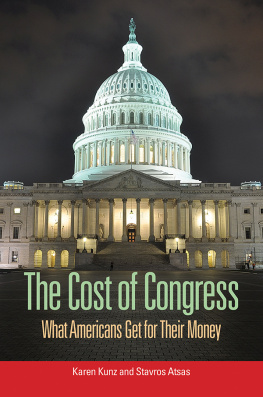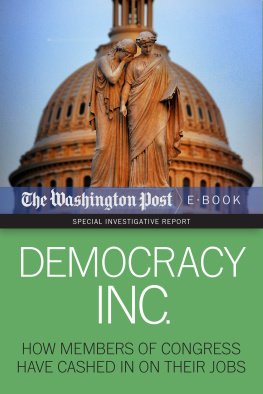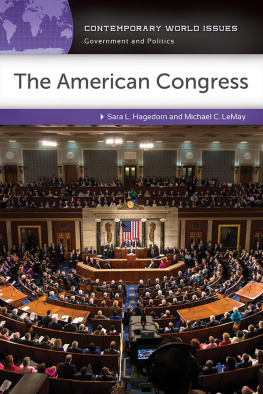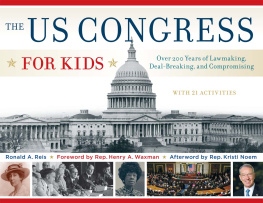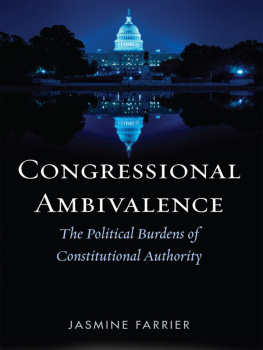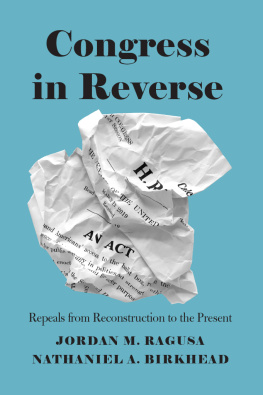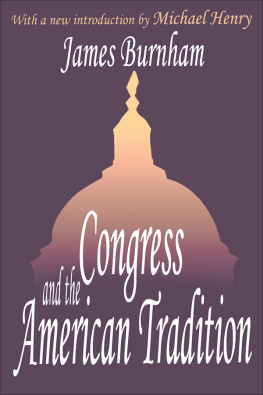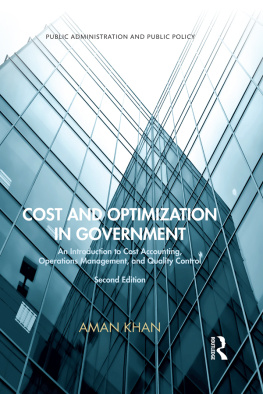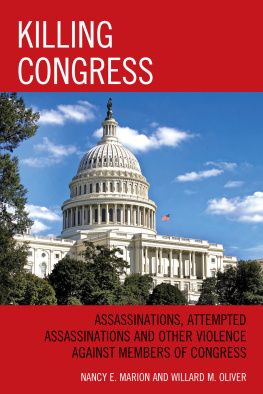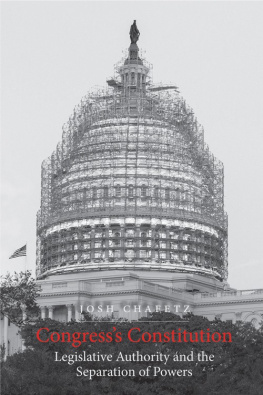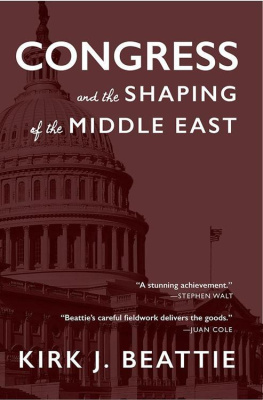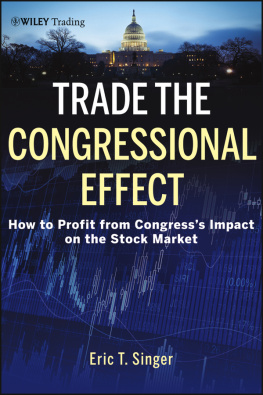The Cost of Congress
The Cost of Congress

What Americans Get for Their Money
Karen Kunz and Stavros Atsas

Copyright 2022 by Karen Kunz and Stavros Atsas
All rights reserved. No part of this publication may be reproduced, stored in a retrieval system, or transmitted, in any form or by any means, electronic, mechanical, photocopying, recording, or otherwise, except for the inclusion of brief quotations in a review, without prior permission in writing from the publisher.
Library of Congress Cataloging-in-Publication Data
Names: Kunz, Karen, 1955- author. | Atsas, Stavros, author.
Title: The cost of Congress : what Americans get for their money / Karen Kunz and Stavros Atsas.
Description: Santa Barbara, California : ABC-CLIO, [2022] | Includes bibliographical references and index.
Identifiers: LCCN 2021059617 (print) | LCCN 2021059618 (ebook) | ISBN 9781440858000 (hardcover) | ISBN 9781440858017 (ebook)
Subjects: LCSH: United States Appropriations and expenditures. | Government spending policyUnited States. | United States. Congress. | BISAC: POLITICAL SCIENCE / American Government / Legislative Branch | BUSINESS & ECONOMICS / Money & Monetary Policy
Classification: LCC HJ2052 .K84 2022 (print) | LCC HJ2052 (ebook) | DDC 339.5/220973dc23/eng/20220107
LC record available at https://lccn.loc.gov/2021059617
LC ebook record available at https://lccn.loc.gov/2021059618
ISBN: 978-1-4408-5800-0 (print)
978-1-4408-5801-7 (ebook)
26 25 24 23 221 2 3 4 5
This book is also available as an eBook.
Praeger
An Imprint of ABC-CLIO, LLC
ABC-CLIO, LLC
147 Castilian Drive
Santa Barbara, California 93117
www.abc-clio.com
This book is printed on acid-free paper 
Manufactured in the United States of America
To our human and almost-human families, and to all of you who want to know what we get for the hard-earned money we give our government.
Contents
We are amazed by and grateful to the many people who have been so generous with their time and expertise! Special thanks to Patrick Washington, Jon Stehle, Ed Brigham, Chuck Lewis, and Reid Boden for your thoughtful feedback and hours of discussion on the content of the chapters. And our sincere appreciation goes out to Damien Arthur, associate professor at Marshall University and Robert C. Byrd, scholar; Bob Bixby at Concord Coalition; Bill Hoagland at Bipartisan Policy Center; Stan Collender; Charlie Johnson, former House Parliamentarian; Phil Joyce and Roy Meyers, professors at University of Maryland and former CBOers; Chuck Bowsher, former Comptroller General and Director of GAO; Holly Harvey and Sue Irving at GAO; Doug Elmendorf and Doug Holtz-Eakin, former CBO Directors; Ida Brudnick and Jim Saturno at CRS; Norm Ornstein at AEI; Paul Posner; Representative Nick Rahall; former House and Senate appropriations professional staff John Lawrence, Keith Kennedy, Scott Lilly, and Tony McCann; Sue Quantius and Faye Cobb, House Legislative Branch Appropriations staff and experts; Matt Wasniewski, House Historian and Farah Elliot, head of the House Office of Art and Archive; Kate Scott, Senate Historian, and Heather Moore, Senate photography curator; Laura Peterson at POGO, and Matt Steele, WVU Research Librarian extraordinaireall of whom were amazingly forthcoming with their experiences working in and with Congress and its legislative partners and their insights on the institution in all its forms. Talking with everyone was delightful, educational, and thought-provoking. Our thanks, also, to Ashley Morgan, MPA, Nicole Pellegrino, MPA, and Jack Swiney, MPAfor outstanding research and transcription work that is part of every chapter.
We especially want to thank the Dirksen Congressional Center for funding our initial studytheir Congressional Research Grant got this ball rolling. And West Virginia Universitys Eberly College of Arts and Sciences for their generous research and travel grants that gave us the time and space to conduct interviews, go through records, and roam the halls of the Capitol.
And a very special thanks to our extraordinary editor, Jessica Gribble, without whom this would not be the book it is.
This has truly been a collaborative effort, in which every contributor was indispensable, and for which we are immensely grateful.
Watching Congress is not as much of a national pastime as watching our favorite sports teams, but maybe it should be. Like it or not, we support our national teamsthe Representatives and Senatorswith every paycheck. The taxes deducted from our wages fund their salaries. As with our favorite teams, there are even salary caps, while some of the veterans and playmakers get paid a lot more than others. Our tax dollars also pay for all the equipment needed and maintain the stadium as well as the coaches and trainers (aka legislative partners) who help make sure that you and I can experience the game in all its glory. We can even get our picture taken with our favorite players.
We can take this sports metaphor a bit further, although it gets a little more convoluted in the process. The Constitution gives the Legislative Branch the power to referee the Executive Branch, so when the Executive Branch acts outside the rules of the game (their Constitutional authority) Congress may flag them and stop play while they deliberate on the weight of the penalty to be delivered. They may even eject the offender if all the referees agree on the call. Congress even has its own scalpersthe lobbyists and political action committeeswho control who can enter the stadium and at what ticket price. Wethe taxpaying publicget the bleacher seats; yet those who can afford the box seats get the attention of the league (the leadership) and the players themselves.
Like our favorite sports teams, the extent to which we love or hate our Representatives and Senators depends on our regional (policy) preferences and how many wins and losses our players rack up. While we idolize our sports teams and their players, sometimes regardless of their win-loss record (like the Cubs fans), the same cannot be said for our Representatives and Senators. In fact, some players dont even like their teams or teammates or even the game anymore, so it often seem like the teams arent even playing the same game.
This book came about from the desire to understand just what the game costs usthe American taxpayers.

Throw the bums out!
Whether its a hapless outfielder, an ineffective pitcher, or a player or manager from the opposing team, weve applied that metaphor to legislators, usually from the opposing party, and even to politicians in general, according to polls taken over the last few decades. If the unprecedented wave of rookies drafted into the House of Representatives during the 116th Congress is any indication, the American taxpayers were clearly ready to change the rules of the game. Yet, Congressional job approval polls show that while satisfaction has marginally increased because of some fresh faces, roughly 75 percent of those surveyed still

